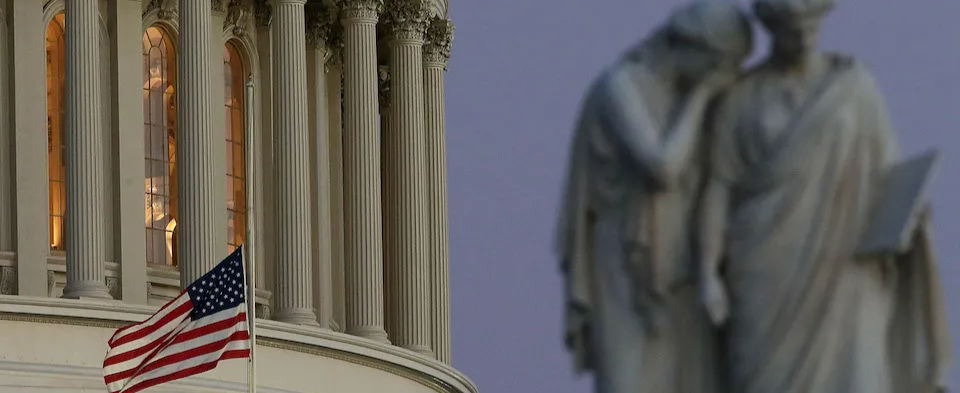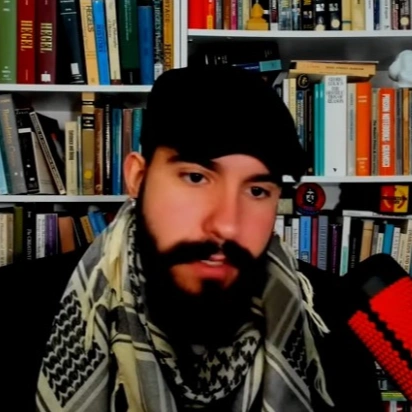The U.S. Is Fabricating Foes to Conceals Its Own Unfreedom

In 1989 Francis Fukuyama famously proclaimed that we had arrived at the “end of history.” Capitalist liberal “democracy” was cherished as the culmination point of humanity’s development, proven in the defeat of “communism” it achieved in the so-called “Cold War.”
More than three decades have passed and that world which was supposed to be final is itself coming to an end. It was an interesting “end of history,” where the U.S. waged uninterrupted wars in the global South (especially the Middle East) which took the lives of tens of millions, and which displaced many more.
 In 1989 Francis Fukuyama famously proclaimed that we had arrived at the “end of history.”
In 1989 Francis Fukuyama famously proclaimed that we had arrived at the “end of history.”
However, it is clear to even the most dogmatic defenders of the old unipolar world that we are in a period of revolutionary transition. The logic which animates geopolitical relations is being radically altered. The days were the U.S. unilaterally imposed its will on the world are coming to an end. Today a new, multipolar geopolitical logic is being born, and it is governed by a mutual respect between nations and civilizations, and an intercourse of trade based on win-win, not win-lose, relations.
It is fair to say, then, that we are living in the “end of the end of history.”
This should not have been unexpected for anyone with the slightest awareness of history itself. History shows that development is an ever-going phenomenon; it demonstrates that everything that comes to be, irrespective of how final and secure it may at first appear, will eventually, as Goethe said, “perish wretchedly.”
The “end of history” was never the “end of history.” It was simply a period were the U.S.’s imperialist power could go unchallenged by any formidable rival. The “end of history” was nothing but a short interlude in a global struggle against Western imperialism, wherein the U.S. held on to a ceaselessly weakening unipolar dominance.
This short interlude provided the time for a resurgence of global powers that could challenge the U.S.’s plan for a “New American Century.” These new global powers, such as China, Russia, Iran, etc., are working upon the legacy of rich ancient civilizations, whose millennium-long cultural insights and experience they have managed to incorporate into their rapid modernization. It has been a modernization, importantly, which has been free of the perils which accomplished Western capitalist “modernization,” namely, the genocide of the Amerindian populations, the African slave trade, and centuries of colonialism, neocolonialism, and imperialism. Internally, far from witnessing the extreme national inequalities which accompanied growth in the capitalist West, these civilizations have managed, as China says, to promote “common prosperity,” to greater or lesser extents, amongst their people. It has genuinely been a tide that has lifted all, or at least most, boats.
 China promoted Common Prosperity, which calls for the people to share in the opportunity to be wealthy.
China promoted Common Prosperity, which calls for the people to share in the opportunity to be wealthy.
For the German philosopher, G. W. F. Hegel, “the History of the world is none other than the progress of the consciousness of Freedom… Freedom is the sole truth of Spirit.” Fukuyama’s phrase on the “end of history” was first uttered by Hegel, who proclaimed that the “History of the World travels from East to West… Europe is absolutely the end of History.” If history is understood as the development of the self-consciousness of the concept of freedom, as Hegel understood it, then “the East knew only that One is Free; the Greek and Roman world, that some are free; [and] the German-Christian World knows that All are free.”
In terms of conceptual recognition, the West today continues to recognize that “all are free.” In fact, it precisely carries out its imperialist operations around the world under the auspices of promoting freedom, democracy, and equality. It uses the concepts of freedom, democracy, and equality to entrench the most profound real unfreedoms, tyrannies, and inequalities in the world. Far from allowing the self-consciousness of the concept of freedom be the means through which actual freedom is realized, a superficial, merely formal recognition of freedom is sustained precisely to reproduce unfreedom in actuality.
Furthermore, through its mass media and indoctrinating educational system, it prevents its population from even accessing the appropriate lexicon through which to communicate such unfreedom. The unfreedoms experienced can never be an inherent feature of the system; ultimate responsibility is always externalized to some pariah “other.”
The unfreedoms of the American people are thus blamed on China, Russia, Iran, etc., and not on the U.S. capitalist system that produced them. In doing so, a dual effect is produced:
1) blame for the real unfreedom is exported to a convenient “other” who challenges U.S. imperial power, and 2) in externalizing the responsibility for your conditions of unfreedom, the limitations to your power appear merely external, i.e., you continue to operate as if you are still free, but “blocked off” from realizing such freedoms by the boogeyman “other.”
Paradoxically, this predicament was eloquently expressed by a Western philosopher who always manages to make support for the imperialist West seem “progressive,” Slavoj Žižek, who noted that “we ‘feel free’ because we lack the very language to articulate our unfreedom.”
Instead of thinking about freedom’s relationship with historical development as conceptual, we should think of it in terms of actuality. The same Hegel which suggests that we think of historical development as the universalizing of the concept of freedom, also equips us with a concrete conception of universality which readily provides us with the tools to affect this turn. In his Lectures on the History of Philosophy, Hegel writes that “Man knows what he is, and only when he does so is he actually what he is. Without this, knowing reason is nothing, nor is freedom.” We can be as self-conscious of our freedom as we want, but if there isn’t actual freedom in our lives, that self-consciousness of freedom is empty and hollow. It is merely freedom in form, without content.
Therefore, Hegel writes that “Freedom can, however, be also abstract freedom without necessity, which false freedom is self-will, and for that reason it is self-opposed, unconsciously limited, an imaginary freedom which is free in form alone.” This is the empty, indeterminate freedom we have in the West. As the French philosopher Michel Clouscard articulated, it is a freedom where “everything is allowed but nothing is possible.” Freedom is always determinate; it is precisely the recognition of necessity, and the ability to positively act upon such a recognition.
This recognition of necessity, in the contemporary social conjuncture, is fundamentally a recognition of the laws of social development shaping our social trajectory. If we are not aware of the real systemic forces that produce the changes we observe in our world, we neither have the recognition of necessity nor the ability to affect our trajectory. This is what the ideological apparatuses of the West, the media, the schools, and the entertainment industry, provide the current social order, namely, the ability to prevent people from recognizing necessity. Even in times of deep social crisis – such as the crisis of legitimacy prevalent in the U.S. – the institutions of knowledge production provide ready-made alternative explanations for the reality at hand. As mentioned earlier, there is always an “other” upon which blame could be placed. This, therefore, systematically produces a recognition of false necessity, and hence, an unfreedom experienced as freedom.
If we understand history as the history of the actuality of freedom, it is evident that we are far from its “end.” However, the collapse of the Western capitalist order that once fooled Hegel into seeing in its abstract proclamation of freedom the “end of history” (a mistake much more unforgiveable when it occurs almost two centuries after with Fukuyama), is a positive step in humanity’s trajectory towards real freedom. The recognition of our recognition of a false necessity, therefore, stands as an important mediational moment for our recognition of real necessity.
Multipolarity is opening the world to what Marx called the “realm of freedom” by recognizing the laws of capitalist social development, and actively intervening to undermine them. This is, fundamentally, what is at stake when countries like China, Russia, Iran, etc. place social and common good over and above the accumulation of capital. That supremacy of capital which warrants labeling the system capital-ISM is being actively undermined by the multipolar world. While this change, as Hegel said, “imports dissolution, [it] involves at the same time the rise of a new life.” The new world being born, as economist Oscar Rojas has described it, is premised on international relations between “associated free producers,” i.e., sovereign countries engaging in win-win geopolitical relations, and is leading humanity into a “communitarian mode of production,” where the aims of socially carried out production are not the accumulation of capital in private hands, but social utility and benefit.
Hegel was right, then, about the sun of world-history setting in the West. But its setting has long passed. Today humanity is in an astronomical dawn. Once again, the sun is rising in the East. While it is not fully out, its light has become visible. A new day is here.



